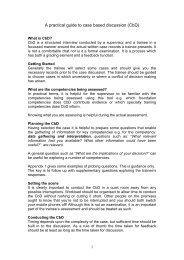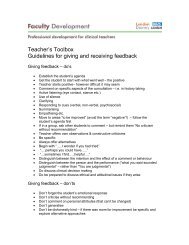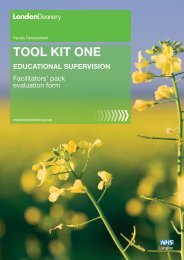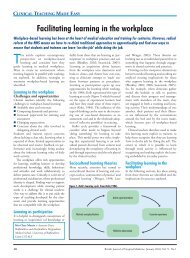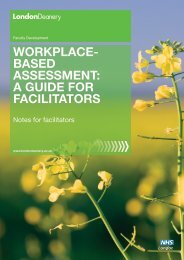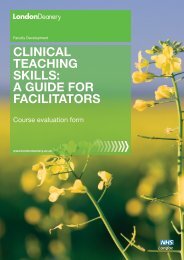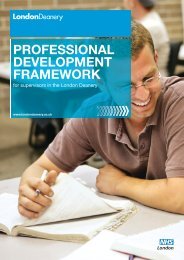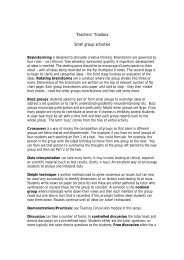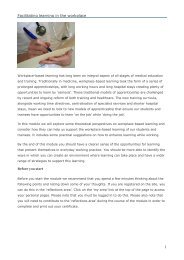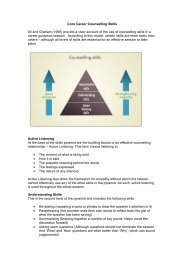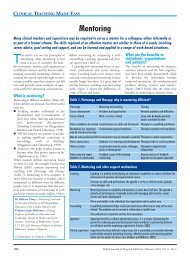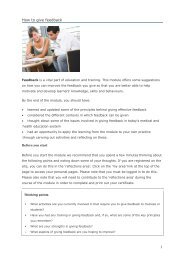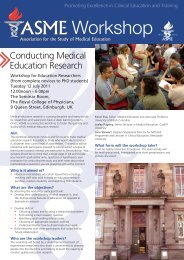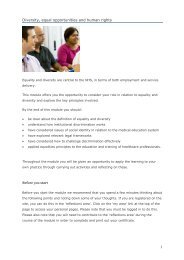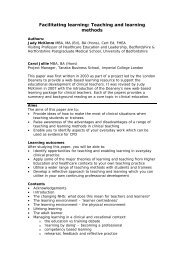Curriculum development module - Faculty Development - London ...
Curriculum development module - Faculty Development - London ...
Curriculum development module - Faculty Development - London ...
Create successful ePaper yourself
Turn your PDF publications into a flip-book with our unique Google optimized e-Paper software.
should be designed with a variety of learning (and teaching) methods<br />
• Learners need to be treated as people and there should be opportunities<br />
for them to make contributions which are valued by teachers<br />
• Effective learning is active – people learn best when they are engaged in<br />
an active process<br />
• Learning has to be relevant to learners’ own experience and needs and<br />
to be set within a clear context or framework. Relevance applies at a<br />
variety of levels: to the overall structure of the course or subject (eg.<br />
medicine or physiotherapy) or to the use of particular terminology<br />
• Learning outcomes or objectives help learners to learn because they<br />
define what the learner has to do, the outcomes should be explicit and<br />
clearly linked to delivery and assessment<br />
• Effective learning needs to be done in a safe environment. Learning is<br />
not always easy and learners must feel comfortable and able to make<br />
mistakes. Feedback should be constructive and timely.<br />
<strong>Curriculum</strong> <strong>Development</strong> - Strategies and models<br />
In the last section, we looked at how, when planning a course, teachers and<br />
course developers need to think about their learners’ needs in terms of the broad<br />
context of undergraduate and postgraduate education, vocational training, the<br />
needs of professional bodies and the requirements from their own organisation.<br />
The sort of questions that curriculum planners might ask at the<br />
start of the process should include:<br />
• What sort of healthcare worker do we want?<br />
• How will we reflect health service changes and demands from<br />
external agencies?<br />
• How will we ensure links to postgraduate requirements and<br />
training (specialist vs generalist)?<br />
• What should the curriculum be like in terms of content, structure<br />
& function?<br />
• How should we establish links to assessment and evaluation?<br />
• How will we identify and overcome barriers to change?<br />
Strategies of curriculum <strong>development</strong><br />
Any curriculum needs to be developed in the light of the organisation or context in<br />
which it is going to be delivered. If a teacher is developing a small part of a<br />
course or programme, then this must fit (in terms of approach, level and content)<br />
with the overall course. If a new course is being designed and developed then<br />
there are a number of approaches that can be taken and issues that need to be<br />
addressed to meet the needs of all stakeholders involved. McKimm’s description of<br />
undergraduate medical curriculum <strong>development</strong> from a project management<br />
approach can be found in Roberts and Ludvigsen, 1998, pp.101- 118.<br />
A strategic issue which needs to be considered is whether the course design,<br />
delivery and management is centralised or decentralised. This is often out of



